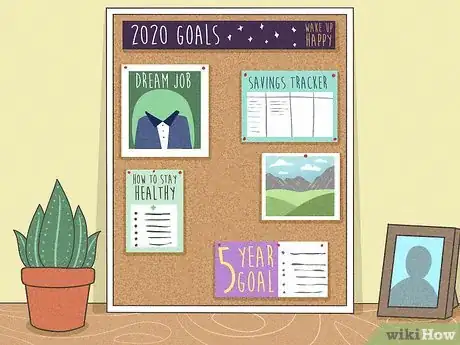This article was co-authored by Camber Hill and by wikiHow staff writer, Danielle Blinka, MA, MPA. Camber Hill is a numerologist, author, speaker, and the owner of Camber Hill Coaching based in Long Beach, California. For over 37 years, Camber has coached entrepreneurs, creatives, business executives, and professional sports figures. He has also inspired creatives in the entertainment industry such as professional directors, writers, actors, and top radio personalities. Camber’s unique use of numerology allows him to understand the under-current which drives his clients to create long-term solutions and measurable results. His work has been featured in the History Channel's "The Human Calculator," The Los Angeles Times, Palm Springs Life Magazine, and California radio programs. He is also a member of The International Coaching Federations and is a board member of the ICF Orange County's Board of Directors. Additionally, Camber is distinguished as a certified business owner by the National Gay and Lesbian Chamber of Commerce.
There are 10 references cited in this article, which can be found at the bottom of the page.
wikiHow marks an article as reader-approved once it receives enough positive feedback. This article received 161 testimonials and 94% of readers who voted found it helpful, earning it our reader-approved status.
This article has been viewed 4,035,078 times.
The law of attraction suggests that you can attract positive or negative things into your life through your thoughts and actions. It relies on the theory that everything is made up of energy, so the type of energy you put out will come back to you. If you’re ready to use the law of attraction to tell the universe what you want, start by creating a positive mindset so that you can send out positive energy. Then, take action toward your goals and confront your setbacks with a good attitude.
Steps
Creating a Positive Mindset
-
1Visualize your dreams coming true. Close your eyes and picture yourself living the life you want. Imagine doing your dream job, showing off your talents, or sliding into your new car. Do this every day to solidify your intentions and bring them one step closer to reality.[1]
- Always picture yourself being successful. For example, imagine yourself getting a promotion at work, not just going about your day-to-day activities. You don’t want to just get the job; you want to excel at it.
-
2Focus on what you want in your life, not what you’re lacking. Don’t think about your old, broken down car. Instead, picture yourself driving a new car. This puts the focus on what you want to bring into your life, rather than what you want to eliminate. It sends the message to the universe that you expect good things to happen![2]
- The idea behind this is that what you’re thinking about is what you want in your life. So if you think, “I wish I had a car that didn’t break down all the time,” you’re still focusing on your old car, not a new one.
- As another example, think to yourself, “I’m studying hard to get a good grade,” rather than, “I hope I don’t fail this semester.”
Advertisement -
3Phrase your desires using positive terms. It’s important to avoid phrases that rely on negative words like “no” or “not” to state what you want, such as “I don’t want to lose my job.” Similarly, include the words for what you want to avoid attracting the wrong thing. For instance, “I don’t want to lose” sends out the word “lose,” while “I want to win” sends out the word “win.”[3]
Tip: The law of attraction suggests that the universe latches onto the words you use, not the intention behind them. That means “no debt” might result in the universe seeing “debt.”
-
4Express gratitude for what you already have. Appreciating the good things in your life helps you feel better about your life, which supports your positive mindset. List the things you’re grateful for aloud, or write them in a gratitude journal. Additionally, thank people for the good things they add to your life.[4]
- For example, write 3 things you’re grateful for every morning before you get out of bed. This helps you start your day in a good mood.
-
5Meditate at least 5 minutes a day to lower your stress levels. Stress is a normal part of life, but too much can be overwhelming. Relieve your daily stresses with a short meditation that will relax both your mind and body. For a simple meditation, sit in a comfortable position, then close your eyes. Focus on your breathing, letting your thoughts come and go.[5]
- You can find guided meditations online or through an app like Calm, Headspace, or Insight Timer.
- Meditation can also help you become more aware of your emotional state, which in turn will help you regulate your emotions more effectively.
- Meditating effectively takes practice. Make it a goal to meditate on a daily basis.
-
6Replace your worries with thoughts about how things could go right. Worrying can make you manifest what you're trying to avoid.[6] When worries happen, challenge them by questioning how likely they are to happen. Then, think about what has happened in the past when you worried. Next, consider how bad the worst-case scenario would be if your worried thoughts actually happened. You'll likely realize it's not that big of a deal in the long-run.[7]
- For example, let's say you're worried you'll embarrass yourself during a presentation. How likely is that to happen? Has it happened before? If you did mess up, would it really matter? Would you still think about it a year later? You'll likely recognize your worry isn't really a big deal.
- It also helps to think about what your life might be like in 5 or 10 years. Will the thing you're worried about even matter then? Probably not. For example, you might worry about failing a test, but you likely won't even remember the test in 5 years.
Tip: If you can't stop worrying, jot down your worried thoughts in a journal. Then, put the journal away to help keep the thoughts out of your mind.
-
7Give yourself time to learn how to stay positive because it can be hard. At first, it will be hard for you to keep your thoughts positive. It's natural for negative thoughts to come back to you. However, you can help yourself focus on the positive by intentionally confronting negative thoughts. Acknowledge them, dismiss them, then replace them with something positive. With practice, you can become more positive over time.[8]
- For example, you might catch yourself thinking, "I keep working so hard, but I don't seem to be getting anywhere." Stop yourself for a moment and think about why you're having this thought. Then, list the positive things you've experienced while working on this goal, such as learning new things or having new experiences. Finally, choose to see something positive in the situation. You might tell yourself, "I'm getting better over time, and I'm proud of my progress."
- After a while, the positive thoughts that you’re choosing to have on a conscious level will become part of your subconscious mind, and positive thinking will become more automatic for you.[9]
Taking Action
-
1Create a vision board for the life you want. Cut out words and pictures from a magazine, print out images, or use photographs to create a collage of what you want. Hang your collage in your living space where you can see it every day. Then, look to your vision board for daily inspiration to work toward your goal.[10]
- For example, you might include photos of a house you like, the car you want, the job title you want, and a couple in love.
- Remember, a vision board is not a magic wand. To get what you want, you’ll need to do something to get it.
-
2Write down your goals and look at this list every day. Think of the goals you want to achieve in life. They can be short-term or long-term. Write them down on a sheet of paper and put this list somewhere you will see it every day, like on your bathroom mirror or on your refrigerator. Make sure that you think about these goals every day so you can stay focused and on track to achieving them![11]
-
3Do one small task every day to work toward your goal. Start by setting a goal to spend 15 minutes a day pursuing your goal. Then, work your way up from there. To keep track of your progress, make a list of small steps you need to take toward your goal, then check them off when you do them. These small actions will help you produce big results![12]
Tip: Try to work on your goal at the same time every day. For example, you might get up 15 minutes earlier every morning to work on your goal. Similarly, you could spend half of your lunch hour everyday pursuing your goal.
-
4Hold yourself accountable for the work you put into your goals. Set expectations for yourself, and acknowledge when you don’t meet them. Then, examine why you struggled to keep up with your expectations and decide if changes need to be made. Similarly, reward yourself for the hard work you put into your goals.[13]
- For example, let’s say you made a goal to spend an hour working toward your goal every day, but you only followed through on the first day. Accept that you didn’t do the work, but also consider if you need to scale back. Maybe try 15 minutes a day to see if you can meet that goal.
-
5Ask for the things you need and want from others. This is the only way for them to know what you expect from them. No one can read your mind, so you have to tell people what you’re thinking. Be direct and honest about what you need and want, and you might just get it.[14]
- Let’s say you want to hang out with your friend. Instead of saying, “I wish I had plans this weekend,” say, “Hey, do you want to see a movie on Friday night?”
- If you need your roommate to help out more around your home, don’t say, “I wish this place were cleaner.” Say, “Could you put your dirty clothes in the hamper and keep your personal belongings out of the common area?”
-
6Use positive self-talk to motivate yourself to take action. It’s normal to have negative thoughts about yourself, but this can hold you back. When you catch yourself thinking negatively, question that thought and replace it with a positive thought. Additionally, repeat your favorite mantra or positive affirmation to yourself throughout the day to keep yourself on track.[15]
- Let’s say you catch yourself thinking, “I’ll never be that good at public speaking.” Question this thought by pointing out that everyone starts somewhere and practice brings improvement. Then, tell yourself, “I am improving at public speaking every time I do it.”
- Throughout your day, repeat a positive mantra to yourself, such as, “I’m living my dreams,” “I’m a success,” or “I radiate joy.”
Responding to Setbacks
-
1Recognize you’re not to blame for accidents, illnesses, or events beyond your control. Everyone experiences hardships at one time or another. This might include losing a job, coping with a medical issue, or suffering an injury. Don’t blame yourself when these things happen, because they happen to everyone.[16]
- Let’s say someone crashed into your car while you were driving. This is an accident, and you didn't cause it. Don’t blame yourself!
- No one can have a perfect life without hardship, even while using a tool like the law of attraction.
-
2Focus on changing your response to hardships rather than avoiding them. You can’t stop all bad things from happening, as this isn’t possible. However, you can choose to have a better reaction to them. Instead of getting upset, accept hardships as part of life. Then, reach out to people who care about you to get support.[17]
- For example, let’s say you lost a job you really wanted. Instead of dwelling on the loss, accept that this time it wasn’t meant to be. Then, think about how you can use this experience to do better next time.
-
3Look for the lesson or silver lining in obstacles or hardships, when you’re ready. This helps you see something good that the hardship brought into your life. When you’re ready, reflect on what happened to see how you grew as a person. Similarly, consider how your experience can enable you to help others.[18]
- Don’t push yourself to look for the lesson or silver lining before you’re ready.
- For instance, failing a class might have taught you how to be a better student, and going through a bad breakup might teach you what you want in a relationship.
-
4Take control after a setback or hardship to boost your confidence. Facing an obstacle can shake your confidence and break your positive mindset, but regaining control gives you back your power. Start by listing the actions you can take to move forward. Then, do one small thing to help you move in the right direction.[19]
- For example, let’s say you lost your job. Instead of dwelling on it, update your resume and go through job listings. While you apply for new jobs, take a free online class to help boost your job skills.
Tip: If you need help, ask for it. Getting support from others can be part of taking control.
Expert Q&A
Did you know you can get expert answers for this article?
Unlock expert answers by supporting wikiHow
-
QuestionHow do you make short term goals?
 Camber HillCamber Hill is a numerologist, author, speaker, and the owner of Camber Hill Coaching based in Long Beach, California. For over 37 years, Camber has coached entrepreneurs, creatives, business executives, and professional sports figures. He has also inspired creatives in the entertainment industry such as professional directors, writers, actors, and top radio personalities. Camber’s unique use of numerology allows him to understand the under-current which drives his clients to create long-term solutions and measurable results. His work has been featured in the History Channel's "The Human Calculator," The Los Angeles Times, Palm Springs Life Magazine, and California radio programs. He is also a member of The International Coaching Federations and is a board member of the ICF Orange County's Board of Directors. Additionally, Camber is distinguished as a certified business owner by the National Gay and Lesbian Chamber of Commerce.
Camber HillCamber Hill is a numerologist, author, speaker, and the owner of Camber Hill Coaching based in Long Beach, California. For over 37 years, Camber has coached entrepreneurs, creatives, business executives, and professional sports figures. He has also inspired creatives in the entertainment industry such as professional directors, writers, actors, and top radio personalities. Camber’s unique use of numerology allows him to understand the under-current which drives his clients to create long-term solutions and measurable results. His work has been featured in the History Channel's "The Human Calculator," The Los Angeles Times, Palm Springs Life Magazine, and California radio programs. He is also a member of The International Coaching Federations and is a board member of the ICF Orange County's Board of Directors. Additionally, Camber is distinguished as a certified business owner by the National Gay and Lesbian Chamber of Commerce.
Life Coach
-
QuestionDo I have to focus on just one thing that I wish?
 DabbuCommunity AnswerNo. It is good to focus and feel abundant about the things that you want, but if you keep thinking about them all the time, then you will release thoughts of doubt, worry and the pain of not having it. The best thing is to focus on what you want for several minutes everyday and then release it and go about your day with gratitude.
DabbuCommunity AnswerNo. It is good to focus and feel abundant about the things that you want, but if you keep thinking about them all the time, then you will release thoughts of doubt, worry and the pain of not having it. The best thing is to focus on what you want for several minutes everyday and then release it and go about your day with gratitude. -
QuestionWhat is the best way to apply the law of attraction to help obtain money and wealth?
 DabbuCommunity AnswerBe grateful for the money that you have been given throughout your life, expect money to come to you in big or small ways, feel good about money and feel as though you are already rich. Finally, ask the universe for the specific amount of money you want to come to you.
DabbuCommunity AnswerBe grateful for the money that you have been given throughout your life, expect money to come to you in big or small ways, feel good about money and feel as though you are already rich. Finally, ask the universe for the specific amount of money you want to come to you.
Warnings
- Avoid worrying, as this sends a message to the universe that you expect bad things to happen. Instead, picture a positive future for yourself.⧼thumbs_response⧽
- Don't focus on a specific person or thing. For instance, don't try to make someone fall in love with you. Instead, draw in a healthy, satisfying relationship with someone you're meant to be with.⧼thumbs_response⧽
- Don’t blame yourself for your hardships! You are not to blame for health issues or the actions of others.⧼thumbs_response⧽
References
- ↑ Camber Hill. Life Coach. Expert Interview. 16 June 2020.
- ↑ Camber Hill. Life Coach. Expert Interview. 16 June 2020.
- ↑ https://www.verywellmind.com/understanding-and-using-the-law-of-attraction-3144808
- ↑ https://www.verywellmind.com/understanding-and-using-the-law-of-attraction-3144808
- ↑ https://www.mindbodygreen.com/0-16150/9-habits-to-manifest-your-dreams-using-the-law-of-attraction.html
- ↑ https://www.youtube.com/watch?v=b295OBuDmyM&feature=youtu.be&t=104
- ↑ https://www.psychologytoday.com/us/blog/how-be-yourself/201606/2-ways-stop-worrying-and-overcome-anxiety
- ↑ https://www.youtube.com/watch?v=b295OBuDmyM&feature=youtu.be&t=572
- ↑ https://www.forbes.com/sites/briannawiest/2018/09/12/13-ways-to-start-training-your-subconscious-mind-to-get-what-you-want/#36b5b5fc7d69
- ↑ https://www.verywellmind.com/understanding-and-using-the-law-of-attraction-3144808
- ↑ Camber Hill. Life Coach. Expert Interview. 16 June 2020.
- ↑ https://www.verywellmind.com/understanding-and-using-the-law-of-attraction-3144808
- ↑ https://www.entrepreneur.com/article/318347
- ↑ https://www.psychologytoday.com/us/blog/fulfillment-any-age/201212/9-ways-ask-and-get-what-you-want
- ↑ https://www.verywellmind.com/understanding-and-using-the-law-of-attraction-3144808
- ↑ https://www.verywellmind.com/understanding-and-using-the-law-of-attraction-3144808
- ↑ Camber Hill. Life Coach. Expert Interview. 16 June 2020.
- ↑ https://www.verywellmind.com/understanding-and-using-the-law-of-attraction-3144808
- ↑ https://www.psychologytoday.com/us/blog/the-squeaky-wheel/201407/the-secret-overcoming-any-setback
About This Article
To use the law of attraction, you want to put positive energy out into the world so that positive things come back to you. You can put out positive energy by thinking positive thoughts, visualizing your dreams coming true, and expressing gratitude for the things you already have. For example, you could start a gratitude journal and write 3 things you're grateful for in it every morning, or you could create a vision board featuring pictures of all the things you want in life. In addition to being positive, try to dedicate at least 15 minutes every day to working toward your goals. Over time, the small steps you take each day will add up and help you achieve greater things! For tips on how to be more positive and overcome setbacks in your life, keep reading!






























-Step-11.webp)

















































